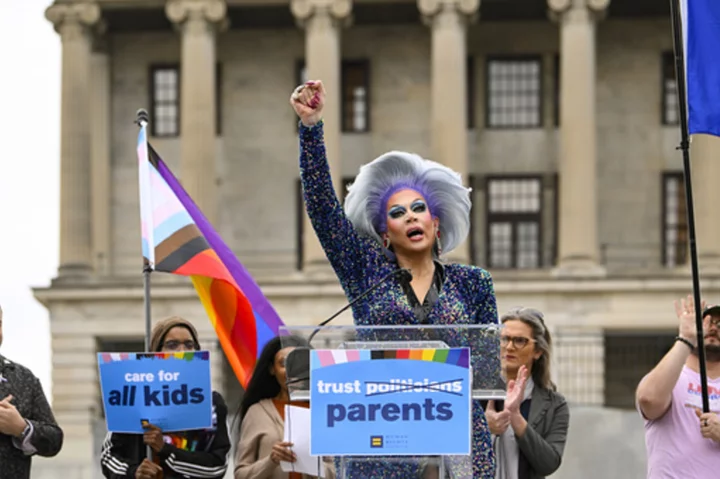NASHVILLE, Tenn. (AP) — A federal judge ruled Friday that law enforcement officials can't use a Tennessee law that strictly limits drag shows to interfere with a local Pride festival this weekend, favoring event organizers who sued after a district attorney warned he intends to enforce the new statute even after another federal judge ruled it unconstitutional.
U.S. District Judge Ronnie Greer in Knoxville granted a temporary restraining order that prevents District Attorney Ryan Desmond and other local law enforcement officials from enforcing the state law or interfering with the Blount County Pride festival scheduled for Saturday. That includes no discouraging of third parties from hosting or modifying the event, including the venue of Maryville College, the judge wrote.
Earlier this year, a federal judge across the state in Memphis ruled Tennessee’s anti-drag show law was “unconstitutionally vague and substantially overbroad,” and encouraged “discriminatory enforcement.” The ruling was celebrated by LGBTQ+ advocates, but it quickly sparked questions because the court declared the decision only applied to Shelby County, where Memphis lies.
While some legal experts have speculated district attorneys across the state wouldn’t enforce a law a federal judge said violated the First Amendment, others, including state Attorney General Jonathan Skrmetti, were quick to point out the law remained in effect outside of Shelby County. Skrmetti's office is appealing the ruling applying to Shelby County.
The American Civil Liberties Union of Tennessee filed the lawsuit Wednesday on behalf of the organizers. Drag performer Flamy Grant, who was hired to perform at the event, is also a plaintiff.
Desmond sent a letter to Blount County Pride organizers this week announcing he planned to enforce the state’s anti-drag law.
“It is certainly possible that the event in question will not violate any of the criminal statutes,” Desmond wrote. “However if sufficient evidence is presented to this office that these referenced criminal statutes have been violated, our office will ethically and justly prosecute these cases in the interest of justice.”
The letter was addressed to the Pride organizers, as well as the county mayor, law enforcement groups and other public officials.
In Friday's court ruling, the judge wrote the Memphis federal judge's previous ruling was "well-written, scrupulously researched, and highly persuasive." He also wrote that "the record strongly, and maybe even conclusively, suggests that District Attorney Desmond issued his notice in response" to Flamy Grant's inclusion in the festival's entertainment plans.
“This ruling allows us to fully realize Blount Pride’s goal of creating a safe place for LGBTQ people to connect, celebrate, and share resources,” Blount Pride Board President Ari Baker said in a news release. "We appreciate the community support and look forward to celebrating with you all on Saturday.”
In a court filing responding to the lawsuit, Desmond wrote his letter did not threaten enforcement.
The judge responded that Desmond did warn would-be violators of the law about his authority and intention to prosecute them. Additionally, the judge wondered why the district attorney sent the notice to multiple local law enforcement officials “if, as he now claims, his notice is merely a paper tiger and nothing more.”
In conservative Tennessee, drag performances and LGBTQ+ rights have increasingly been targeted by the Republican-dominant General Assembly.
The Legislature’s GOP supermajority and Republican Gov. Bill Lee enacted the anti-drag show law in March. Many supporters said drag performances in their hometowns made it necessary to restrict them from taking place in public or where children could view them.
Notably, the word “drag” doesn’t appear in the new law. Instead, the statute changed the definition of adult cabaret in Tennessee to mean “adult-oriented performances that are harmful to minors.” Male or female impersonators are now classified as a form of adult cabaret, akin to strippers and topless, go-go, or exotic dancers.
The law banned adult cabaret performances on public property or anywhere minors might be present. Performers who break the law risk being charged with a misdemeanor or a felony for a repeat offense.
The ACLU of Tennessee has previously said drag shows do not inherently fall under the law’s narrow definitions, which include extreme sexual or violent content without artistic value. But the ACLU and other advocates for LGBTQ+ rights have feared that officials could use the law subjectively to censor drag artists.
Since the ruling affecting Shelby County, Lee has refused to weigh in on whether district attorneys should continue enforcing the law, saying he would defer to the attorney general.
Skrmetti's office did not immediately respond to an emailed request for comment on Friday's ruling. The Blount County district attorney's office did not answer a phone call seeking comment on the decision.

